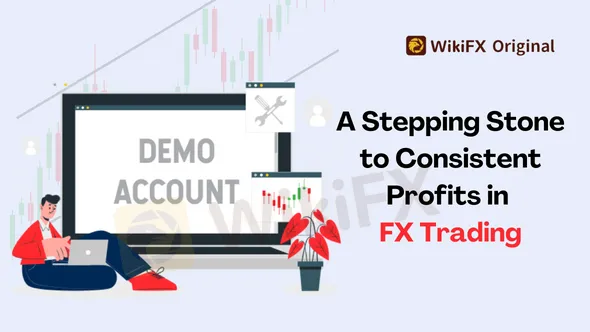简体中文
繁體中文
English
Pусский
日本語
ภาษาไทย
Tiếng Việt
Bahasa Indonesia
Español
हिन्दी
Filippiiniläinen
Français
Deutsch
Português
Türkçe
한국어
العربية
Demo Account: A Stepping Stone to Consistent Profits in FX Trading
Abstract:Most forex brokers provide their clients with a demo account option. A demo account is also known as a practice account or a fake account.

A demo account is similar to a real account, except that the money involved is not real. Traders can opt for a specific amount of starting “capital” and the leverage level to kickstart their new demo account.
The main purpose of a demo account is to enable traders to learn trading without risking any real money. Simultaneously, this allows users to gain first-hand experience with their selected brokers respectively. This is a good opportunity to evaluate the trading platform provided, the stability of its trading environment, the responsiveness of customer support, and more before depositing their hard-earned money.

We at WikiFX have constantly seen too many scam cases wherein users deposit money into an unreliable forex broker and have withdrawal issues later on. Therefore, if one spots a red flag or feels any discomfort during demo trading, it is encouraged to switch to another broker and not proceed further.
However, demo accounts are not only limited to newbie traders. Many experienced traders also use it to test out a new strategy, indicator, or expert advisor (also known as trading robot) before involving real money. This is a helpful feature as aforementioned; a demo account has access to all live market information which enables a trader to evaluate his performance before diving right in.
During demo trading, you will encounter many unexpected situations, which will help you better understand the trading processs general framework. For example, you may discover that you will only be able to trade during certain days or hours. Or, it could be that you find more confidence in trading currency pairs rather than commodities.
The goal of demo trading is to demonstrate the success of the trading technique used and its ability to generate consistent profits in the real market and to better understand yourself as a trader, without risking a single cent!

Disclaimer:
The views in this article only represent the author's personal views, and do not constitute investment advice on this platform. This platform does not guarantee the accuracy, completeness and timeliness of the information in the article, and will not be liable for any loss caused by the use of or reliance on the information in the article.
Read more

Forex Trading: Scam or Real Opportunity?
Meta: Explore forex trading: Is it a scam or real opportunity? Learn how it works, debunk myths, manage risks, and avoid scams with tools like WikiFX App. Start trading safely today!

T&D vs AvaTrade: Which Broker Suits Your Trading Needs in 2025?
In this article, we compare these brokers based on basic information, regulatory status, leverage, trading platforms, account types, spreads and commissions, customer service, AI tools, and recent updates. Our goal is to provide an objective overview so you can decide which broker aligns better with your trading style and requirements.

5 Arrested in the TriumphFX Investment Scam Investigation
Malaysian authorities have intensified their investigation into the TriumphFX foreign exchange investment scam, resulting in the arrest of five individuals linked to the fraudulent scheme.

Notice: The WikiFX Simulated Trade Weekly Competition has been suspended for one week
Due to an upcoming product upgrade to enhance your overall trading simulation experience, the WikiFX Simulated Trading Weekly Contest will be temporarily suspended from March 10 to March 16. The contest will resume on March 17 with a host of improvements.
WikiFX Broker
Latest News
Is $CORONA Memecoin a Legit Crypto Investment?
Is Pi Network the Next Big Crypto Opportunity?
Donald Trump’s Pro-Crypto Push Boosts PH Markets
Japan’s Shift in Crypto Policy and What It Means for Investors
Is Linkbex a Scam? SFC Warns of Virtual Asset Fraud in Hong Kong
5 Best Copy Trading Brokers: You Can Trust in 2025
3 EXCLUSIVE Ramadan Offers That Won’t Last Long! ACT NOW
The Next Crypto Giants: 5 Altcoins to Watch
Forex Trading: Scam or Real Opportunity?
The Hidden Tactics Brokers Use to Block Your Withdrawals
Currency Calculator






